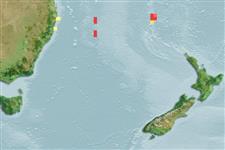Teleostei (teleosts) >
Gobiiformes (Gobies) >
Gobiidae (Gobies) > Gobiinae
Etymology: Eviota: No etymology given, suggested by Christopher Scharpt: from Latin 'eu' for 'true' and 'iota' for anything very small, in combination 'truly very small' referring to it as being the smallest vertebrate at the time it has benn described by Jenkins (thus, making the suggestion by Scharpt plausible; readerae: Named for Sally E. Reader.
Eponymy: Sally E Reader is an ichthyologist at the Australian Museum Research Institute. [...] (Ref. 128868), visit book page.
More on authors: Gill & Jewett.
Environment: milieu / climate zone / depth range / distribution range
Ecology
Marine; reef-associated; depth range 0 - 30 m (Ref. 59013). Temperate
Southwest Pacific, Middleton and Elizabeth Reefs on the Lord Howe Rise, Tasman Sea.
Size / Weight / Age
Maturity: Lm ? range ? - ? cm
Max length : 1.8 cm SL male/unsexed; (Ref. 59013)
Short description
Identification keys | Morphology | Morphometrics
Dorsal spines (total): 7; Dorsal soft rays (total): 9; Anal spines: 1; Anal soft rays: 8; Vertebrae: 26. This species is distinct with the following set of characters: D VI + I, 9; A I, 8; with some pectoral-fin rays branched; fifth segmented pelvic-fin ray is lacking; cephalic sensory-pore system pattern 1; non-fimbriate male genital papilla; dark bars or saddles 12-13 on trunk from origin of spinous dorsal fin to mid peduncular spot, not extending below midline (except in small juveniles); pectoral-fin base with a prominent circular dark spot dorsally (sometimes with additional small diffuse spot ventrally) (Ref. 59013). Dorsal to anal fin-ray formula 9/8 (Ref. 116739).
Specimens were collected from tidal pools, lagoon patch reefs and reef slopes at depths from about 0.3 to at least 30 m (Ref. 59013). Benthic, also found in coral and rock reefs (Ref. 75154).
Life cycle and mating behavior
Maturity | Reproduction | Spawning | Eggs | Fecundity | Larvae
Gill, A.C. and S.L. Jewett, 2004. Eviota hoesei and E. readerae, new species of fish from the Southwest Pacific, with comments on the identity of E. corneliae Fricke (Perciformes: Gobiidae). Rec. Western Aust. Mus. 56:235-240. (Ref. 59013)
IUCN Red List Status (Ref. 130435: Version 2024-1)
Threat to humans
Harmless
Human uses
Tools
Special reports
Download XML
Internet sources
Estimates based on models
Preferred temperature (Ref.
123201): 21 - 22.9, mean 21.6 °C (based on 15 cells).
Phylogenetic diversity index (Ref.
82804): PD
50 = 0.5000 [Uniqueness, from 0.5 = low to 2.0 = high].
Bayesian length-weight: a=0.01023 (0.00477 - 0.02194), b=3.01 (2.83 - 3.19), in cm total length, based on LWR estimates for this (Sub)family-body shape (Ref.
93245).
Trophic level (Ref.
69278): 3.0 ±0.3 se; based on size and trophs of closest relatives
Resilience (Ref.
120179): High, minimum population doubling time less than 15 months (Preliminary K or Fecundity.).
Fishing Vulnerability (Ref.
59153): Low vulnerability (10 of 100).
Nutrients (Ref.
124155): Calcium = 158 [58, 726] mg/100g; Iron = 0.781 [0.259, 2.074] mg/100g; Protein = 18.2 [15.8, 20.3] %; Omega3 = 0.433 [0.105, 1.832] g/100g; Selenium = 8.29 [1.82, 33.67] μg/100g; VitaminA = 65.8 [7.9, 530.2] μg/100g; Zinc = 2.88 [1.29, 5.71] mg/100g (wet weight);
